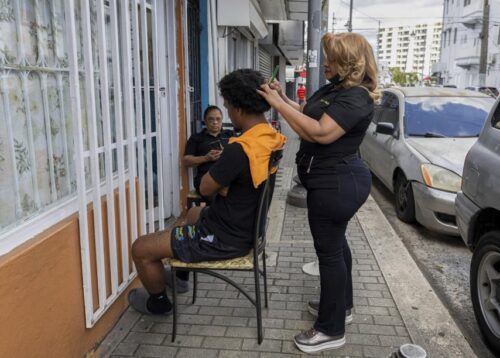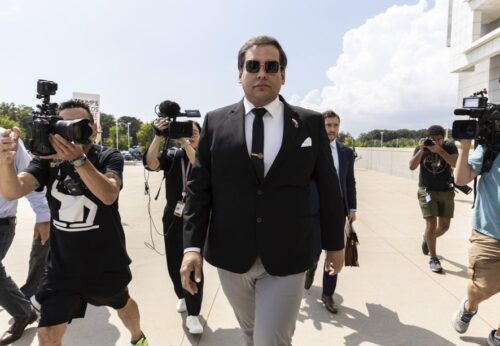The Texas House of Representatives voted early Thursday morning to create one of the largest taxpayer-funded school voucher programs, a hard-fought victory for private school choice activists as they turn their attention to a nationwide voucher push.
The measure still has some legislative hurdles to clear before Governor Greg Abbott signs it into law, but the House vote — 85-63 — secured a win that was decades in the making, propelled by the governor’s hardball politics last year. It was also a significant defeat for Democrats, teachers unions, and some rural conservatives who had long worried that taxpayer-funded private-school vouchers would strain public school budgets.
The program would be capped at $1 billion in its first year, but could grow quickly, potentially reaching an estimated $4.5 billion a year by 2030. The funds can be used for private school tuition and for costs associated with home-schooling, including curriculum materials and virtual learning programs.
The bill was championed by an ascendant wing of the Republican Party, closely allied with President Trump and important conservative donors, including Betsy DeVos, Trump’s wealthy former education secretary, and Jeff Yass, a billionaire financier from Pennsylvania and a Republican megadonor.
Hours before the vote, the president spoke by phone to Abbott and Republican representatives, urging them to support the measure. “It’s a really forward-thinking vote,’’ Trump said, his voice heard on speakerphone. “Whatever I can do, let me know.’’
Those in the room cheered.
“It’s time to provide a full array of options to parents,’’ Representative Brad Buckley, a sponsor of the bill, said from the House floor before the vote.
Conservatives and some liberal allies, especially in urban centers, have long argued that vouchers would free parents from underperforming public schools, while competition from private schools would force public education to improve. Opponents, especially teachers unions, have argued just as vociferously that taxpayer-funded vouchers would drain resources from public education and leave children with the fewest resources stuck in underfunded public schools of last resort.
Representative Chris Turner, a Democrat from the Dallas area, accused supporters of seeking to resegregate education.
The measure, he said, “will harm students with disabilities. It will harm rural students.’’
At the very least, some Democrats argued that what they called a “voucher scam’’ was a giveaway to parents who have already opted out of public education. The savings accounts would not be large enough to cover the full tuition of some private schools, but would instead offset the expenses of children already enrolled in such schools, opponents argued.
“With this bill,’’ said Representative James Talarico, a Democrat from the Austin area, “we’re giving money to parents who are already sending their kids to private school.’’
For years, charter schools and public school choice seemed to be a compromise between Democrats and Republicans. But as the COVID-19 pandemic raised dissatisfaction with public education, conservative donors and their advocacy groups broke the stalemate in some states, advancing their vision of unrestrained parental choice, in which as many tax dollars as possible are redirected to families to spend on private education.
Before Texas, states such as Arizona, West Virginia, and Iowa passed a new form of private-school voucher known as an education savings account, or ESA.
It gives money directly to parents — not to private schools — and is notable for the flexibility it grants in how the funds can be spent.
Supporters of private school choice said that because Texas was the last major Republican-led state to embrace the policy, attention would now shift to Washington. Trump and some congressional Republicans are attempting to pass a federal tax credit for private school scholarships, which could spread private school vouchers nationwide, including into Democratic-led states.
“It has been a 40-year hand-to-hand fight,’’ said Genevieve Collins, the Texas director for Americans for Prosperity, a conservative group that has pushed for the education savings account program. “This is genuinely transformative, not just for Texas, but for the rest of the country.’’
Clay Robison, a spokesperson for the Texas State Teachers Association, an affiliate of the National Education Association, said public school students could experience larger class sizes, canceled enrichment programs, and more substitute teachers as public funds flow to private schools.
The Texas Senate had already passed a similar school choice plan. Now members of the two chambers must align their proposals, after a final procedural vote in the House, expected this week.
But with support in the Texas House now confirmed by Thursday’s vote, the last real hurdle has been cleared.
Abbott, a Republican, raised and spent millions last year in a successful effort to oust nearly a dozen Republican representatives who had opposed the measure. He exerted pressure on Republicans up until the end.
“This is an extraordinary victory,’’ Abbott said in a statement after the vote. “When it reaches my desk, I will swiftly sign this bill into law.’’
The Texas program would provide about $10,000 to students for private school tuition, or up to $30,000 for disabled students. It would also offer up to $2,000 for home-schooling costs. If demand exceeds funding, priority for the money will go to children with disabilities and those from low-income and middle-class households who were previously enrolled in public schools. But the money could eventually become available to any child, including those already enrolled in private education.
The funding will come out of the state’s general fund.


